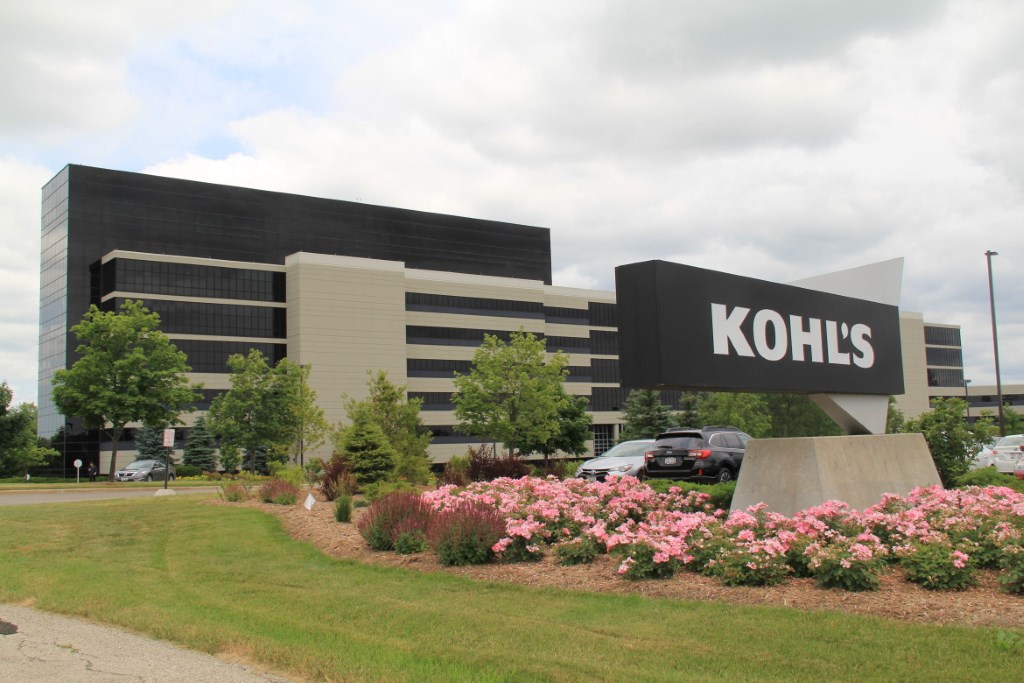State Gave $472 Million in Business Tax Credits
Hand-outs to Amazon, Kohls, Quadgraphics and 16 other companies bleed state treasury.

In 2012, Kohl’s Corp. was awarded up to $62.5 million in tax credits from the Wisconsin Economic Development Corp., in part to build a new headquarters and expand its Wisconsin workforce by 3,000 workers. As of September 2015, the company also had created just 473 of the 3,000 jobs it plans to add. Photo by Tara Golshan of the Wisconsin Center for Investigative Journalism.
“Where did all that money go?” Dennis asked me during a recent visit to the Jackson County Fair.
Dennis is one of many constituents who ask where the money for schools and roads is as our state recovers from the recession. Economic recovery means more money and more money should equal more resources for the public. Instead, state funds are very tight. For example, state aid to local public schools is less now than in 2006.
One reason is that the state is not collecting tax money from some large, and in several cases, very profitable companies. Recently I received a memo from the nonpartisan Legislative Fiscal Bureau detailing the awards given out for one large tax credit known as the Enterprise Zone Tax Credit. This credit – originally conceived to help rural communities – has morphed into large credits for single companies.
The memo contained a list of the total awards made and the companies that received them:
| Amazon.com | $10.3 million |
| Bucyrus International, Inc. | $20.0 million |
| Direct Supply | $22.5 million |
| Dollar General Corporation | $ 5.5 million |
| Exact Sciences Corporation | $ 9.0 million |
| Fincantieri Marine Group, LLC | $28.0 million |
| InSinkErator | $15.5 million |
| Kestrel Aircraft Company, Inc. | $18.0 million |
| Kohl’s Corporation | $62.5 million |
| Mercury Marine | $65.0 million |
| MKE Electric Tool Corporation | $18.0 million |
| Northstar Med. Radioisotopes, LLC | $14.0 million |
| Oshkosh Corporation | $47.0 million |
| Plexus Corporation | $15.0 million |
| Quad/Graphics, Inc. | $61.7 million |
| Trane US Incorporated | $5.5 million |
| Uline, Incorporated | $18.6 million |
| W Solar Group, Incorporated | $28.0 million |
| Weather Shield Mfg, Incorporated | $8.0 million |
| TOTAL (through Aug. 1, 2016) | $472.1 million |
All of those award amounts are refundable tax credits. This means a company can claim the credit directly against taxes owed. If the company owes little or nothing in taxes and claims the credit, they can receive a payment from the state in the form of a refund.
Owing little or nothing in state taxes is made possible, in part, by changes in tax law for corporations that date back to 2011. Majority legislators passed the Manufacturing and Agriculture Tax Credit that resulted in very low tax liability for some. A recent study released by the Wisconsin Budget Project found most of this credit goes to reducing taxes for millionaires, including “some tax filers with incomes of over $1 million receiving tax cuts of more than $100,000.”
Credit compliance is overseen by the troubled Wisconsin Economic Development Corporation (WEDC), which does not have a good track record for independently verifying that jobs were created. Three separate audits by the nonpartisan Legislative Audit Bureau showed that not one single job created was independently verified.
Earlier this year, the Wisconsin State Journal reported that WEDC’s claims of jobs created were based on “faulty calculations”. They went on to report, “The agency gave out almost $90 million more in awards, but the total number of related jobs fell by nearly 6,000.”
The cost of the Enterprise Zone Tax Credit and the Manufacturing and Agriculture Tax Credit would go far in covering the cost of reforming our state’s flawed school funding formula or funding repairs for local roads.
Sen. Kathleen Vinehout, D-Alma, is a member of the Wisconsin state Senate.
Op-Ed
-
Wisconsin Candidates Decry Money in Politics, Plan to Raise Tons of It
 Dec 15th, 2025 by Ruth Conniff
Dec 15th, 2025 by Ruth Conniff
-
Trump Left Contraceptives to Rot; Women Pay the Price
 Dec 8th, 2025 by Dr. Shefaali Sharma
Dec 8th, 2025 by Dr. Shefaali Sharma
-
Why the Common Council’s Amended Budget is Good Policy for Milwaukee
 Nov 20th, 2025 by Alds. Marina Dimitrijevic and Russell W. Stamper, II
Nov 20th, 2025 by Alds. Marina Dimitrijevic and Russell W. Stamper, II





















If I recall, at least with Mercury Marine, I think that was part of the effort to retain that company in Wisconsin when they were looking to leave for Oklahoma.
http://archive.jsonline.com/business/mercury-marine-launches-20-million-expansion-in-fond-du-lac-s56kq6h-167561965.html
Simply googling California business tax credits or watching cable news commercials of the state of New York giving out state tax credits to simply move it business from another state shows how out of touch the Wisconsin Democratic party is.,
“Simply googling California business tax credits or watching cable news commercials” is a crazy way to form an opinions and make a sketchy conclusions. Don’t listen to cable news commercials or people named Jason.
Looking at this list, everyone one that I’m familiar with either saved a company from moving out of state, was directly tied to actual jobs created, or helped a company expand. You take away these “hand outs” and you’ll lose both the jobs and the taxes paid by these companies and their employees. Short sighted indeed.
@AG At least as of Sept 2015 (don’t have new numbers) Kohl’s was no where close to creating the jobs it was supposed to. (Though reading back on the history it’s more complicated than just jobs created so…whoknows)
Jason…moving businesses from one state to another is a zero sum game where there are no winners besides the business owners who get a massive payout on the backs of taxpayers. These games can only be played for so long before the communities run out of money and the businesses play the next state/muni for “incentives” to locate in their jurisdiction.
And look at the companies who have received the credits. Almost NONE are new businesses, the real JOB CREATORS, but instead multi-billion dollar, many international companies, simply playing the local politicians for a boost to their bottom line.
And of the “new” businesses selected, most were just pipe dreams like W Solar or Krestel, who actually created ZERO jobs in the state.
And to bring up California shows how out of touch you really are…
Dave Reid, I thought they were only awarded a fraction of that $64 million based on how many jobs were created and how much they spend on capital expenditures. So if they don’t hire or build, they don’t get the money. The details are a bit sketchy for me though, would have to spend time looking it up.
@AG yeah that’s why I added my () comment… It’s not as straightforward as as just here’s the credit.
This was apparently written to produce maximum shock value. Might I suggest that the article should mention how the cost of these credits (per capita considering size of the states) compares with national norms. As it stands, it’s hard for me to label this as “good”, “bad”, or “indifferent”. States are in competition, at least indirectly, to attract and retain employers that offer good paying jobs and add to the economic health of the communities in which they are located. When successful we should be able to point to expansion or at least preservation of the overall tax base.
As one comment mentioned, there may be conditions attached to some of the credits. One would hope this is more the norm than the exception — I just do not know, and the article didn’t go into that rationale.
If such tax credits are truly giveaways (crony capitalism) to “friends”, then it is shameful. But if they are investments, looking toward the longer term, that would seem to take on a different appearance.
Chuckie, maybe Tom Barrett can give a tax credit to Repair that BP gas station in Sherman Park or is that to pro business for you?
A tax credit from the bureaucratic establishment for BP, Jason? Nahhh. Barrett: “Let them eat motor oil.”
Besides, gas stations will be superfluous once the trolley expands to service the Sherman Park neighborhood. They will all be converted into coffee houses, tourist information centers, and cute little pop-up art galleries.
Some neighboring states have mutually legislated against having such tax-credit “incentives” used to poach each other in what Sean called a “zero-sum game.”
That type of poaching can also happen within a state. Minnesota’s dedication to pursuing “regional” solutions has been noted as one factor in their high livability/QOL/affordability in both cities and suburbs. They also so things like create regional transit and support Green industries.
It seems Wisconsin’s economic policies are dictated by interests that can afford to hire pricey lobbyists to push legislation that will serve their narrow interests. Thus, the views of economists and concerns of small-businesses have a tougher time being considered.
Does this surprise anyone? Scott Walker ran on a corporate welfare platform and was honest about it. The real problem is voters who think that’s good policy.